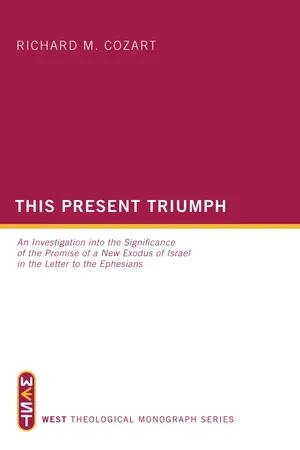
This Present Triumph
An Investigation into the Significance of the Promise of a New Exodus of Israel in the Letter to the Ephesians
- 344 pages
- English
- ePUB (mobile friendly)
- Available on iOS & Android
This Present Triumph
An Investigation into the Significance of the Promise of a New Exodus of Israel in the Letter to the Ephesians
About This Book
The author of Ephesians shows an interest in the Isaianic new exodus (INE) in facilitating his focus on the present triumph of the people of God. The recipients required both insight and confidence, especially in regard to the certainty of their salvation, its mysterious nature, Jewish-Gentile relations, and their former manner of life. In the face of these challenges the author maintains that victory is secured through God's choice of them and the working of his redemptive program--which inevitably leads to triumphal blessings. As with the exodus-era Hebrews, the readers participate in paschal redemption, now embodied in Christ, along with his resurrection and ascension as the triumphant new exodus warrior over principalities and powers. In addition, and as predicted by OT writers, Gentile proselytes share the blessings of the new exodus, but now on equal footing and access as Jewish Christians--creating a new eschatological temple. Triumphant Christ distributes gifts, facilitates Spirit-endowed living, and enables Christian warfare that mirrors Yahweh and his servant. The recipients of the epistle appear to be called to view INE triumph as above, below, now and not yet, while not discarding current applications on earth.
Frequently asked questions
Information
Table of contents
- Title Page
- Tables and Figures
- Abbreviations
- Chapter 1: Introduction
- Chapter 2: The Formative Influence of the Exodus
- Chapter 3: A Review of the Approaches to the Use of the OT in Ephesians and the Works That Have Recognized the Influence of the INE in the Epistle
- Chapter 4: An Introduction to the Triumphal Aspect of the INE in Ephesians
- Chapter 5: Co-enthronement with Christ as Present INE Triumph, Eph 1:1–23
- Chapter 6: Present INE Triumph Observed in Redemption, Reconciliation, and Temple Building, Eph 2:1–22
- Chapter 7: The Author’s Explanation of Apostolic Ministry in Accordance with Present INE Triumph, Eph 3:1–21
- Chapter 8: The Present INE Triumph of the Ascended and Gift-Giving Christ, Eph 4:1–16
- Chapter 9: Manifestations of Present INE Triumph in Ethical Renewal, Eph 4:17—5:20
- Chapter 10: Present INE Triumph Exhibited in Household Codes, Eph 5:21—6:9
- Chapter 11: Reflections of INE Triumph in the Panoply Metaphor, Eph 6:10–24
- Chapter 12: Conclusion
- Bibliography